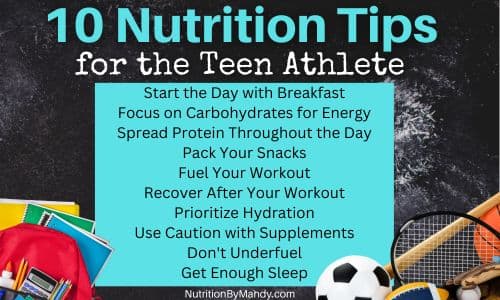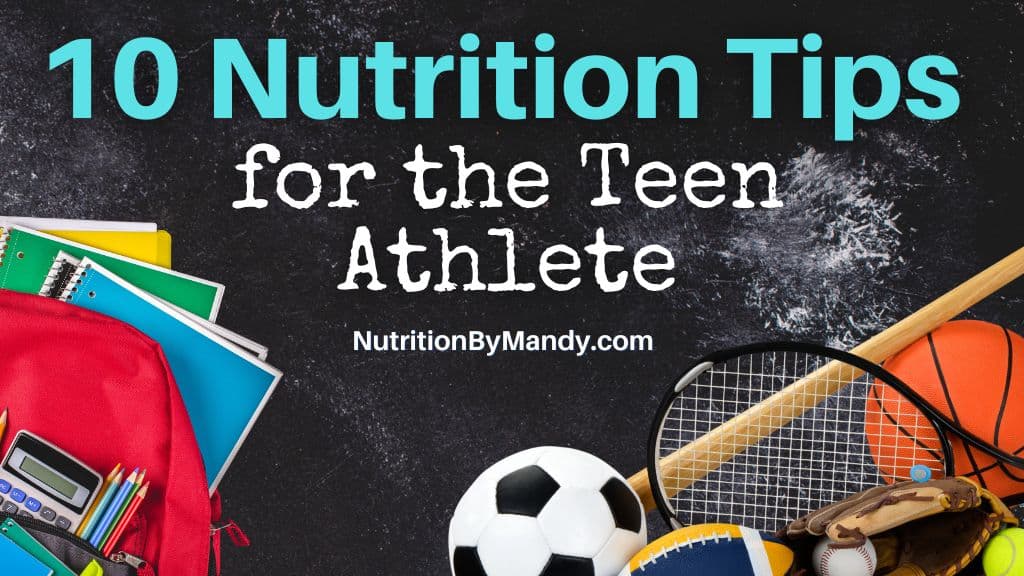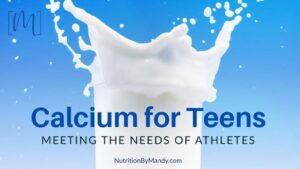Last Updated on November 19, 2025 by Mandy Tyler, M.Ed., RD, CSSD, LD
10 Nutrition Tips for the Teen Athlete
It can be helpful for teen athletes to have sports nutrition strategies they can easily incorporate into their busy schedules.
Here are 10 nutrition tips for the teen athlete to support training and performance.
#1: Start the Day with Breakfast
Starting the day with breakfast is a key sports nutrition strategy for the teen athlete. Consistently eating breakfast is important for the overall health and well-being of teens.
Regular breakfast consumption is associated with improved cognitive function, memory, grades, and school attendance (1). In addition, consuming breakfast is important to provides teens with the energy needed for the activities of the upcoming day.
Despite the importance of breakfast, I find it is a meal often skipped as teen athletes rush out the door in the morning.
Easy Breakfast Ideas for Busy Teen Athletes
Breakfast does not have to be a sit-down meal to be beneficial. Breakfast-on-the-go can be a convenient way to help teen athletes start the day with a nutritious meal.
Consider the following breakfast on-the-go ideas:
- Greek yogurt, frozen mixed berries, granola
- Protein overnight oats
- Whole grain bagel, nut butter, banana, high-protein milk
- Hardboiled-eggs, breakfast bars, grapes
- English muffin with ham and cheese, apple slices, low-fat milk
- Fruit smoothie

#2 Focus on Carbohydrates for Energy
Similar to gas for a car, carbohydrates provide the body with fuel to run on. Athletes can get carbohydrates in the diet from a variety of sources, including:
- Grains: Bread, pasta, rice, oatmeal, cereal
- Fruit: Fresh, frozen, dried, canned in natural juices, applesauce
- Starchy vegetables: Potatoes, sweet potatoes, winter squash, corn, peas, beans, and legumes
- Dairy: Milk and yogurt
The carbohydrate needs of athletes vary based upon both the intensity and duration of activity the athlete is engaged in (2).
Pro Tip: On days when athletes will be exercising more intensely or for a longer duration, they should increase the amount of carbohydrates in their meal plan.
#3 Spread Protein Throughout the Day
In addition to carbohydrates, protein is important in the diet of teen athletes to support the growth and maintenance of lean muscle mass.
Potential sources of protein athletes can enjoy with their meals include:
- Chicken, turkey, seafood, pork, lean cuts of red meat, eggs
- Milk, cheese, cottage cheese, and Greek yogurt
- Beans and legumes
- Nuts and nut butters
- Soy and tofu
Teen athletes following a vegetarian or vegan diet should make sure to include a variety of plant-based sources of protein in their meal plan.
Protein Needs of Teen Athletes
Protein recommendations for athletes are typically based upon body weight. Research looking at adolescents, indicates that teen athletes should consume ~0.3 g of protein per kg of body weight at each of several meals and snacks throughout the day (3).
Generally, this calculates to be in the range of ~15-25 grams of protein per meal for most teenage athletes; with larger athletes needing more protein than smaller athletes.
I find teen athletes often do well with protein intake at lunch and dinner, but tend to consume less protein with breakfast and snacks.
Encouraging teens to add protein to meals and snacks can help them with meeting their daily protein requirements.
Pro Tip: Looking for ways to add protein to a shake without the use of protein powder? Make sure to check out my blog on protein shakes for teen athletes.
#4 Pack Your Snacks
Enjoying healthy snacks throughout the day can help teen athletes meet their sports nutrition needs.
Well-planned snacks help provide athletes with the energy needed for the day’s activities. In addition, snacks can help fill nutrient gaps in a teen athlete’s diet.
Athletes can turn snacks into “mini-meals” by combining a carbohydrate-rich food item with a source of lean protein.
Easy balanced snack ideas for teen athletes include:
- Peanut butter and jelly on honey wheat bread
- String cheese with whole grain crackers
- Apple slices with nuts
- Cottage cheese with pineapple
- Beef jerky with fig bars
- Trail mix made with pretzels, whole grain cereal, dried fruits, and nuts
- Granola bars with nut butter
- Hummus with pita chips
Pro Tip: Teen athletes should take time to pack their snacks in advance to ensure they have nutritious options available during the day. For additional snack ideas, check out my blog 21 Healthy Snacks for Athletes to Support Performance.

#5 Fuel Your Workout
When it comes to sports performance, athletes want to ensure they go into their workouts and competitions well fueled to train and perform at their best.
In general, the amount and type of food that athletes should eat before a workout or competition depends on how much time they have prior to the start of the activity.
Pre-Workout Meal Ideas for the Teen Athlete
When athletes have 3-4 hours before the start of the activity, they can plan to eat a meal that contains a good source of carbohydrates and a moderate amount of lean protein. In addition, the pre-workout or pre-game meal should be relatively low in fat and fiber.
Example meals teen athletes can enjoy before a workout or competition include:
- Pancakes with sliced banana and scrambled eggs
- Fruit smoothie, bagel with nut butter
- Turkey sub sandwich, pretzels, apple slices, low-fat milk
- Grilled salmon, steamed rice, green beans, dinner rolls
- Pasta with marinara (tomato sauce), grilled chicken, and vegetables, breadsticks
Pre-Workout Snacks for the Teen Athlete
When athletes have less time before the activity, they should focus on eating easy to digest, high-carb snacks.
In the hour or two before a workout or game, teen athletes can enjoy the following quick snacks:
- Small piece of fresh fruit
- Applesauce squeeze, dried fruit, fruit leather
- Bagel, fig bar, low-fat granola bar
- Pretzels, pita chips, snack crackers
- Dry breakfast cereal, graham crackers, animal crackers

#6 Recover After Your Workout
Recovery nutrition is one area many teen athletes can quickly capitalize on to support performance.
Recovery nutrition is particularly important when the amount of time between workouts or games is limited. This includes athletes who are doing two-a-day workouts or who have back-to-back days of intense workouts or competitions.
There are three key concepts teen athletes should keep in mind to support recovery:
- Rehydrate– Replace fluid and electrolytes lost in sweat during the activity
- Carbohydrates– Refill energy stores used during the activity
- Protein – Consume protein to help build and repair lean muscle mass
Recovery Nutrition Snack Ideas for the Teen Athlete
If it will be several hours prior to the next meal, athletes should consume a post-workout snack following their workout session or competition.
Quick and easy snacks athletes can enjoy following activity include:
- Trail mix with pretzels, dried fruit, nuts, and dry cereal with sports drink
- Low-fat chocolate milk and granola bars
- Peanut butter and jelly sandwich with low-fat milk
- Greek yogurt, berries, and granola
- Ham and cheese wrap with sports drink
- Sports bar with sports drink
- Post-workout smoothie
Recovery Nutrition Meal Ideas for the Teen Athlete
Teen athletes can follow-up their recovery nutrition snack with a well-balanced meal in the next couple of hours.
Ideas for post-workout or post-game meals include:
- Grilled chicken sandwich, fruit and yogurt parfait, pretzels, low-fat milk
- Burrito bowl with rice, chicken or steak, black beans, corn salsa, guacamole and a sports drink
- Roasted salmon, sweet potato, steamed broccoli, dinner rolls, and 100% fruit juice
- Pasta with lean meat sauce, salad, breadsticks, low-fat milk
- Grilled pork chop, brown rice, green beans, sliced melon, tart cherry juice

#7 Prioritize Hydration
Hydration is a critical aspect of a teen athlete’s sports nutrition game plan.
Dehydration can negatively impact cognitive function and sports performance. In addition, dehydration increases the risk of heat illness, especially when exercising in a hot and humid environment (4).
Hydration needs of athletes vary greatly in regard to both the amount of fluid and electrolytes (namely sodium) lost in sweat. Therefore, having an individualized hydration plan for before, during, and after activity is important.
Pro Tip: Encourage teen athletes to carry a water bottle with them throughout the day as a reminder to hydrate.
#8 Use Caution with Supplements
It can be tempting for teen athletes to think supplements are necessary to help them perform at their best.
However, athletes should use caution with supplements, as they are not regulated by the Food and Drug Administration in the same way that food is.
Sport supplements may contain banned substances that could make an athlete ineligible for competition or be harmful to the athlete’s health (5).
In addition, supplements many contain added stimulants and mega-doses of nutrients that are not necessary for sports performance.
Third-Party Certification of Supplements
Due to the concerns related to supplements containing banned substances, athletes should look for supplements that have been third-party tested.
When a supplement is third-party tested, it has been evaluated by an outside organization for accuracy of ingredients. In addition to ingredients, the outside organization evaluates the supplement company’s manufacturing process and procedures.
Two companies that evaluate and certify sports supplements are NSF International Certified for Sport and Informed Sport. From their websites you can search for products and supplement brands that have been tested and certified by the organization.
Ask for Guidance on Supplements
If you have questions regarding the use of sports supplements, seek guidance from a sports dietitian nutritionist.
The sports dietitian nutritionist can evaluate the supplement and work with your teen on a plan to help meet their sports nutrition goals.

What About Energy Drinks for Teen Athletes?
Similar to sports supplements, teen athletes should use caution with energy drinks. Energy drinks are marketed with the claims of having a unique “energy blend” to help increase alertness, focus, and boost energy levels.
In addition to caffeine, energy drinks may include ingredients such as: taurine, B Vitamins, guarana, green tea extract, L-carnitine, ginseng, ginger root, and chromium (6). The combination of ingredients in the drink may have a synergistic effect in the body and lead to health concerns (7, 8).
Use Caution with Energy Drinks
For these reasons, teen athletes should use caution with energy drinks. As a mom and sports dietitian, I do not allow my teen athlete to consume energy drinks. I feel the potential risks of negative side effects are too high.
Teen athletes who feel they are lacking in energy should ensure they are consuming enough calories and carbohydrates to support their training needs.
In addition, teen athletes need to ensure they are getting enough sleep each night to allow their bodies time to rest and recover.
#9 Don’t Underfuel
Teen athletes participating in competitive sport are often expending a high number of calories each day. Many teens compete in both high school sports as well as club sports resulting in multiple practices and competitions throughout the week.
In addition to sports related activities, teens are expending energy through normal daily activities, as well as the energy needed for normal growth and development.
When daily caloric expenditure exceeds dietary intake of calories from foods and beverages an imbalance occurs. We refer to this imbalance of calories as Relative Energy Deficiency in Sport or REDs (9).
Relative Energy Deficiency in Sport (REDs)
REDs is associated with a syndrome of concerns having health impacts throughout the body.
Low energy availability can negatively impact bone health, menstrual function, immune health, cardiovascular function, protein synthesis, metabolic rate, and GI function. In addition, it can disrupt normal growth and development and have negative impacts on psychological health (9).
Impact of Underfueling on Sports Performance
Sports performance is also impacted by the caloric imbalance. Athletes with inadequate energy intake may experience decreased muscle strength and endurance performance. Athletes with low energy availability are also at an increased risk for injury and illness (9).
Meeting with a sports dietitian nutritionist is important for athletes struggling to intake adequate calories to support health, daily activity, and sports performance needs.
A sports dietitian can help identify ways to balance out your caloric intake and ensure all nutrient needs are met.

#10 Get Enough Sleep
Getting adequate sleep is important to support optimal sports performance as well as the physical and mental health of the teen athlete.
Regularly getting insufficient sleep is associated with learning and behavior problems as well as an increased risk for anxiety, depression, and self-harm (10).
In regard to performance, inadequate sleep is associated with difficulty concentrating, slowed-reaction time, fatigue, decreased immune function, and impaired athletic performance (11, 12).
Despite the importance of sleep, it is often an area that is neglected by many teen athletes. The American Academy of Sleep Medicine recommends teens (ages 13-8) get 8-10 hours of sleep each night (10).
Positive Sleep Habits for Teen Athletes
It can be beneficial to help teen athletes develop positive sleep habits to support them in getting adequate, quality sleep each night.
Ideas for promoting improved sleep include (13):
- Create a consistent sleep routine by going to bed and getting up at the same time each day
- Make the bedroom cool, dark, and quiet
- Limit the use of electronics before bed
- Use the bed for sleeping only, not for studying or playing video games
- Develop a relaxing sleep routine, such as reading, journaling, mindfulness exercises, or deep breathing

10 Nutrition Tips for the Teen Athlete
You are now set with 10 tips to support teen athletes with training and performing at their best.
Encourage teen athletes to focus on making one of these tips a daily habit. Once this is accomplished, the athlete can choose another habit to work on. Small, gradual changes can have a positive impact on health and performance when applied consistently over time.
For additional sports nutrition tips for teen athletes, check out my blog: Nutrition Tips for Afterschool Sports.
Join the Nutrition By Mandy Email List & Get a Free Athlete’s Grocery List
Click HERE to join the Nutrition By Mandy e-mail list. When you join you will receive a free athlete’s grocery list to print and take with you to the store.
About the Author
Mandy Tyler is a Sports Dietitian Nutritionist in the San Antonio, TX area. She is a Registered and Licensed Dietitian, a Board-Certified Specialist in Sports Dietetics, a Licensed Athletic Trainer, and is a Certified Exercise Physiologist through the American College of Sports Medicine. Mandy has experience working with athletes at the high school, collegiate, and professional levels. She believes the key to reaching one’s full potential, both in everyday life and in sports performance, relies on a healthy nutritional foundation.

If you are looking to take your performance to the next level, make sure to check out my new Sports Nutrition Game Day Guide. This downloadable guide is written to help athletes develop an individualized plan to achieve peak performance on game day.





